Sales Management. Definition, basic methods and tools

Much has been written about sales management. However, what is this complex process really about? How do you reconcile being a good manager, taking care of your team, with the need to use a CRM system and control indicators?
Read our article and learn about the basic methods and tools useful in the area of customer service and sales.
The 75% rule
When IBM ran into financial problems in the early 1990s, a new CEO was appointed, and the CEO immediately contacted McKinsey & Company, one of the better-known strategic consulting firms.
IBM sought to find out what was the main factor causing sales to fall so sharply. The consultants, after several months of analyzing the company’s situation, concluded that the reason for the melting profits, was poor time management.
It turned out that both managers and other employees were spending 75% of their time behind a desk, filling out forms. They too rarely met with potential customers outside the company’s headquarters. They were not active in the field.
The consultants recommended reversing the ratio – after the changes, 75% of the employees’ time should be spent meeting customers and presenting them with the benefits of products and services.
In addition, managers were also involved – before they were paging through hundreds of sheets of paper and drowning in piles of papers, and from now on they were to take an active part in meetings with key customers.
The result of the changes was astonishing – huge financial losses turned into spectacular profits. This is just one example of how many factors must be taken into account when managing sales. However, what is this process really about?

Driving sales success: The crucial role of sales process management and KPIs
In the ever-evolving world of sales management, a profound understanding of the sales process is essential for any successful sales team. Sales managers are charged with the responsibility of nurturing and driving sales teams towards achieving specific sales targets. In fact, statistics show that companies with a defined sales process witness 18% more revenue growth than those without.
The sales process is delineated into various sales pipeline stages, the intricacies of which are overseen by both sales reps and sales leaders. The overall efficacy of this process is gauged by a variety of Key Performance Indicators (KPIs).
These KPIs, from sales revenue to customer acquisition cost, provide data-driven insights, enabling sales leaders to adjust strategies to optimize results. Interestingly, according to a 2022 report, companies who effectively manage their sales pipelines have seen a 15% increase in their year-over-year revenue.
The intersection of CRM, Customer Lifetime Value, and sales-marketing collaboration
With digital transformation reshaping traditional sales efforts, the use of tools like Customer Relationship Management (CRM) systems has become indispensable. A well-maintained CRM system can lead to a 47% improvement in sales rep performance and a 43% boost in customer retention.
Furthermore, the nexus between sales and marketing teams has become more crucial than ever. These teams work in tandem to generate sales qualified leads, gradually guiding them through the sales funnel from prospects to existing customers.
An underpinning factor to consider here is the customer lifetime value; a higher value signals better customer retention and boosts sales revenue. Research indicates that increasing customer retention rates by just 5% can lead to a profit increase between 25% and 95%.
Additionally, sophisticated analysis of sales data can unveil hidden trends and patterns, offering strategic advantages that can drastically lower customer acquisition costs and enhance overall sales performance.
Sales management: performance and the melting pot of personalities
Sales management involves setting tactical goals, developing strategies, executing and monitoring ongoing sales activities, as well as scheduling tasks and motivating salespeople to perform even better.
“Sales management is not a strict discipline, because salespeople are definitely different from most other employees. A sales manager must be at once a friend, an advisor, a confidant, a strict supervisor and an effective business man. Salespeople go through emotional ups and downs, experiencing both ups and downs in sales.
Each of them also has their own quirks, which require a manager to have enormous amounts of patience and above-average interpersonal skills.
An outstanding sales manager can create a cohesive, effective team out of a melting pot of personalities that will consistently deliver predictable results month after month,” is how Brian Tracy defines the process.
Consequently, it is incumbent on the manager not only to think about executing sales plans, but also to build a team that plays to one goal. According to Tracy, as much as 95% of success depends on the kind of colleagues a manager selects.

How to build an effective sales team?
The following principles of the tool can be helpful when you are concerned about being a modern leader.
1. Choose the right people
Before you decide who will make up the sales team, think about what qualities you are looking for, it happens that managers apply the “Law of Three”.
This means that before you make any decision, you should talk to at least three candidates, and the best ones are worth talking to three times in three different places. Then you have a chance to see other personality traits.
2. Consult your choice
Another part of the law says that the best candidate should still be talked to by three other people from the company. You can also contact the person’s previous employers. The more time you spend on recruitment, the less chance you have of disappointment later.
3. Be a leader
Remember that as a manager you are the one who stands at the forefront, mentors and sets the standards. When in doubt, salespeople will turn to you.
4. Set realistic goals and listen to the team
It’s clear that your role is to motivate salespeople to perform better and better, but it’s worth setting sales goals fairly for salespeople with more and less experience.
5. Opt for open communication
In the best teams there are no games and ulterior motives for action, the rules should be understood and transparent, and everyone on the team should feel comfortable with what has been established.
6. Offer training to the team and be supportive
As Brian Tracy describes in his book, the return on investment (or ROI) in sales training can be as much as thirty times greater than the outlay invested in a given employee.
According to him (he cites research results in the publication), the higher the sums spent on sales training, the better sales results are recorded.
7. Manage your sales department’s time
If you can implement a modern CRM (in English – Customer Relationship Management) system for managing customer relationships, don’t hesitate.
CRM systems have various functions, and by choosing a CRM, you can tailor it to the needs of your business. Your sales department will gain strong technical support, and the quality of customer service will increase.
8. Determine the flow of information and work
The team needs to know what the sales funnel looks like in the company and how the contact with a potential customer should go, what steps to take one by one to make the sales process effective.
9. Be open to novelty and learn the advantages of automation
Sales automation and a good CRM system in the company will support your sales team in many fields. A modern CRM system is a database. It collects and organizes, but also allows you to schedule tasks, send automatic follow-ups, or automatically generate contracts. This is a great time saver for salespeople.
10. Optimally assign roles
If you use a good CRM (data analysis) system, and know your team, you already know who among your salespeople is better at other roles or works more with a particular group of customers.Use this knowledge to take your sales to the next level.
11. Appreciate good salespeople
There should be a clear bonus system in the company, and praise for a job well done should be expressed among the team.

The big three, or managing through sales targets
You already know the principles that affect effective team building, but what’s next? What do various sources say about methods of managing sales and its resources, or simply salespeople?
One management method is the concept of management by objectives. It was created in the 1950s in the United States, but nevertheless its assumptions have not lost their relevance.
Brian Tracy describes the result of a study conducted by 150 researchers in 10,000 organizations from 20 countries. It found that the three most important factors leading to sales success and causing increased efficiency are:
- goal setting – top-performing companies set weekly or monthly goals for their employees,
- setting precise rules and deadlines for performance – establishing by when a target must be met and at what level,
- rewarding performance – clear rules for remuneration promote performance.

The golden rule of management
Management methods include:
- management by results – also known as management by results, characteristic of organizations heavily focused on financial results, is a focus on achieving specific goals and objectives by the company’s most profitable departments. It’s more about results than how the team achieves goals,
- management by exception – is a method whereby managers should develop an action plan only for a situation that deviates from standard profits, instead of analyzing every element of business operations.
Regardless of which method you focus more on, remember the “Golden Rule of Management,” which reads (and is also a quote by Jack Welch, director of General Electric):
“Manage your people as if you expect the situation to turn around and in a year’s time you will be the one working for them.”
This means to be the kind of leader you yourself would want to work with. It also means to give your salespeople the freedom to act as long as they meet the demands placed on them and achieve their goals.

CRM (Customer Relationship Management) system vs Sales management
It will be easier for salespeople to realize Key Performance Indicators (in English – KPIs) if they can use modern technology to support sales and automate repetitive activities.
The most important step is to implement a CRM system – in English – Customer Relationship Management. The definition of CRM emphasizes how important it is to build valuable contacts and relationships with contractors.
Besides, the CRM philosophy assumes that the overriding goal in your company is to keep your customers happy, and as a result, a CRM system has many useful tools to assist this process.
On the one hand, CRM tools help salespeople better organize their work and contacts with contractors, on the other hand – they organize and arrange sales processes.
In addition, one of the advantages of implementing a CRM system is also the ability to analyze data and generate reports needed by the manager to monitor the process.
However, before you implement a CRM system, find out what else this kind of software can do for you and your team.

CRM system collects your customers’ data
First, the company’s CRM software allows you to collect and organize customer information.
A CRM database is a database of contractors containing the most important data, such as the name of the organization, address, contact information for the representative, purchasing preferences or the entire history of contacts, for example.
With the help of a clear data structure and ordering of information, the CRM system supports customer relationship management from the very beginning. It assumes that CRM system users have access to the same contractor data.
In a modern CRM system, the salesman also has access to a whole suite of tools to facilitate daily contact. This is, for example, scheduling tasks and sending reminders to email, automating the sending of SMS messages, saving meetings in the calendar, adding notes and additional files.
With a CRM system, the salesperson manages customer service, and you as a manager are kept abreast of what has been done and what elements of the process are worth improving.
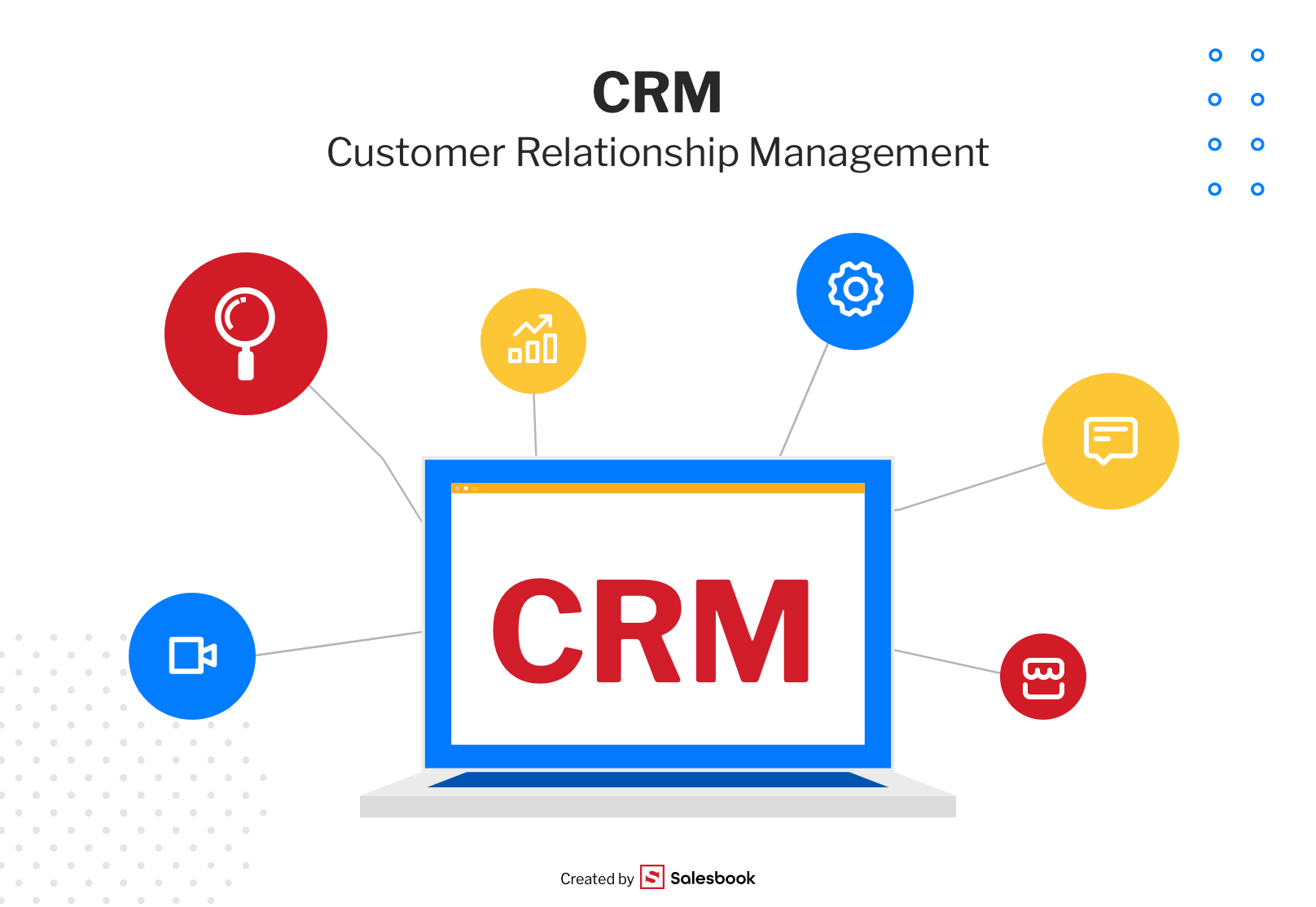
CRM software and sales management process tailored to your needs
However, a CRM system is much more than that. Not only does it make it easier to deal with potential customers, it is also a sales management system. You can take advantage of many CRM functionalities and, depending on which system you choose, tailor a CRM program to your needs.
Let’s start with the fact that sales processes involve the sales funnel, that is, the activities that salespeople carry out. By using a CRM system, you can match the structure of the funnel to how sales actually work in your company.
By doing so, you establish a workflow. At any given moment you know what sales opportunities are likely to be won.
Besides, by defining and analyzing your salespeople’s next steps in the CRM system, you gain a complete picture about the process. You are able to fill in the gaps, modify activities and add elements that data analysis indicates.
It’s time to think about what functionalities are most important for you to achieve what you care about and what elements your CRM strategy should include. You should certainly focus on the benefits of sales automation.
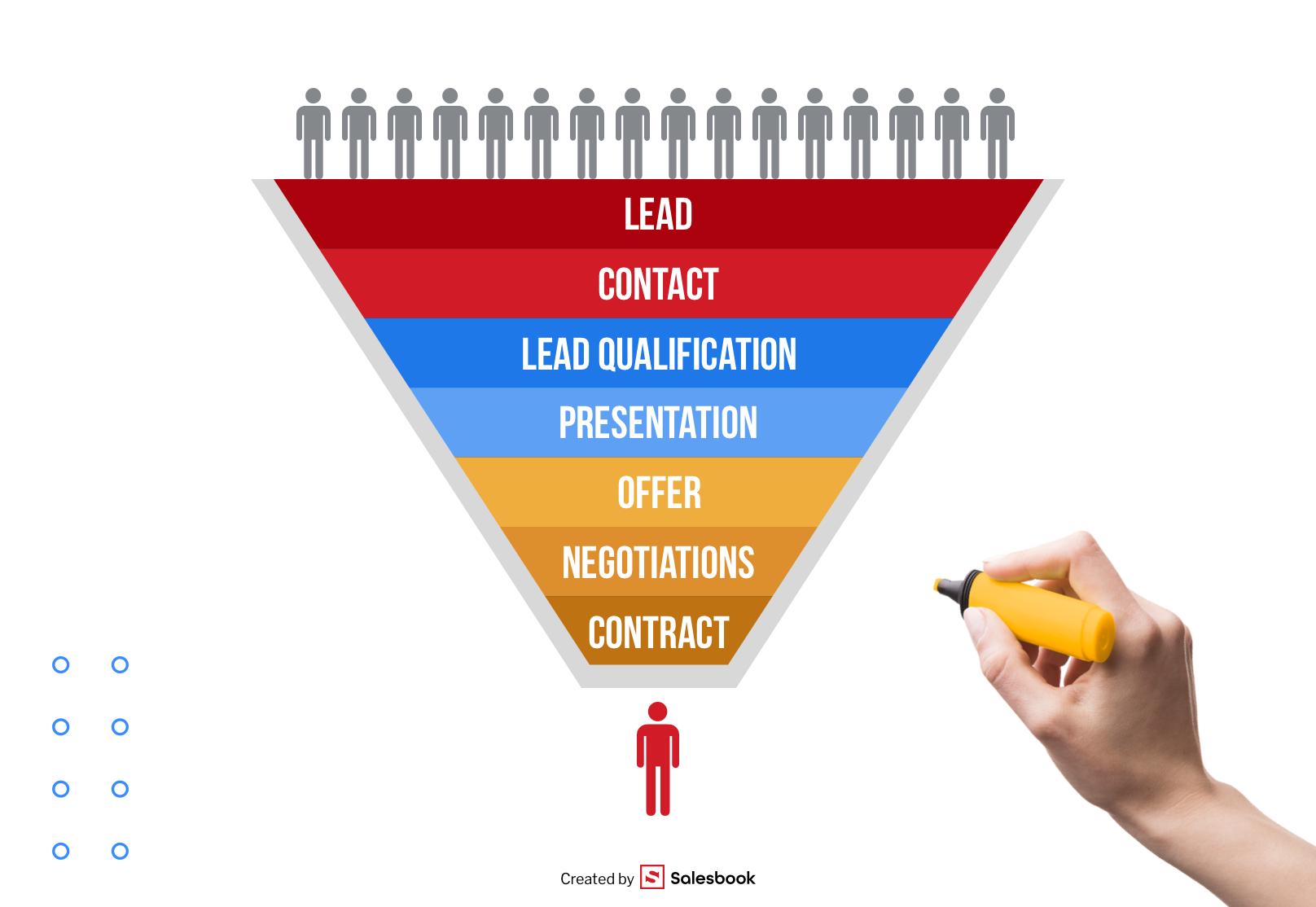
CRM system vs Effective time management and automation
Repetition of monotonous tasks at work that can be automated is capable of discouraging even the most dedicated salesman.
Typing in data, making summaries, sending emails, compiling reports – these are tedious activities that salespeople can spend up to 2/3 of their day on.
Do you recall the 75% rule? Sounds a little familiar doesn’t it? Fortunately, CRM is an IT system that automates many processes between current and potential customers and your company. It also influences the building of long-term relationships with contractors.
When a CRM system sends automated emails, follow-ups, text messages, or schedules a work day, salespeople have more time to keep in touch with customers.
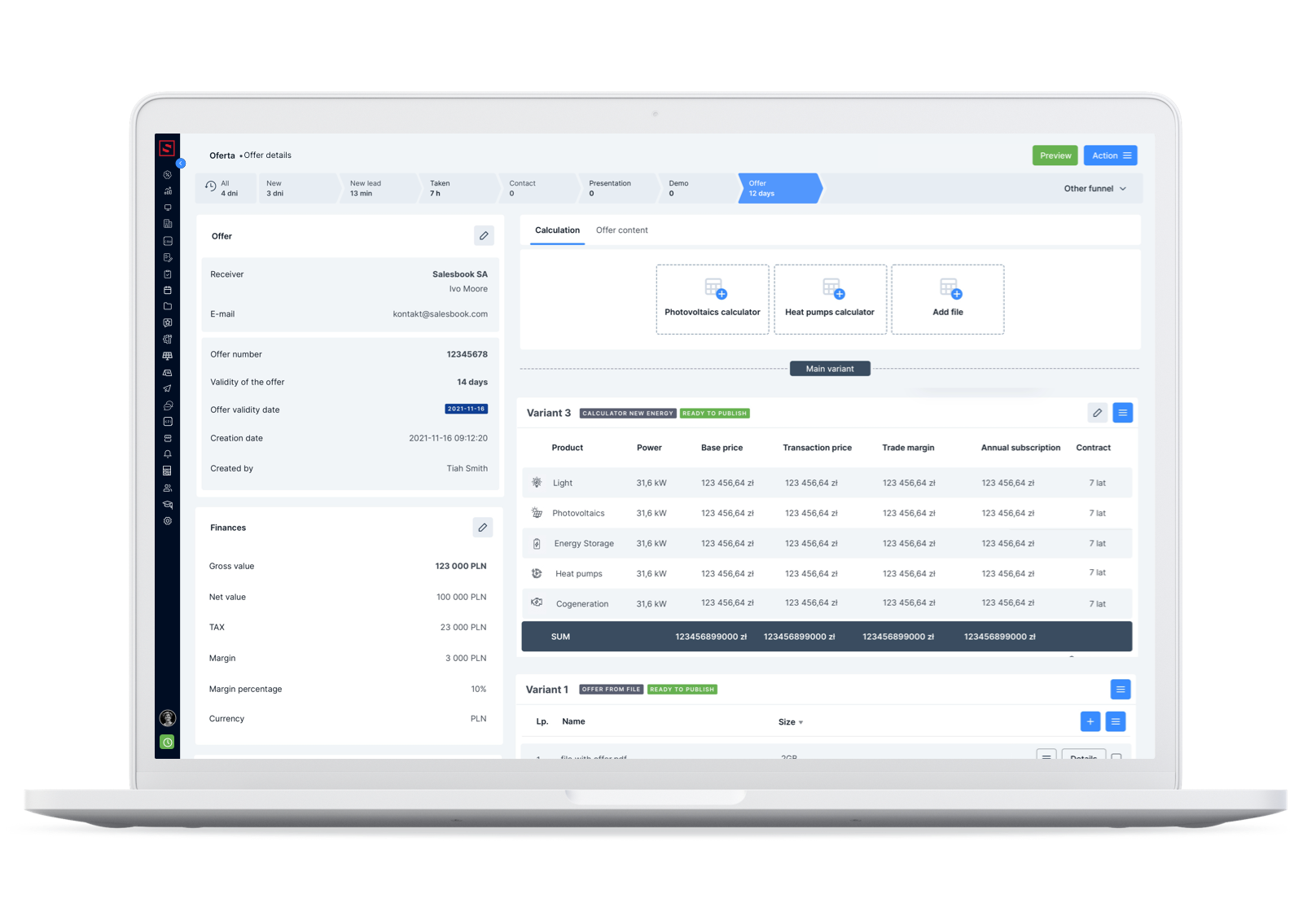
Salesbook: a CRM system and application that supports the sales team
In this case, Salesbook stands out from other CRM solutions, offering much more in addition to the advantages of a CRM program described above.
Salesbook is a cloud-based CRM system located on the provider’s servers. This makes it possible for salespeople to work from any location, as well as to use the CRM system on iOS.
Salesbook is an app, CRM and virtual assistant for salespeople in one. How it works. During a meeting, the salesperson, using the app on a tablet, highlights the most important information about the customer, performing a needs analysis.
At the same time, all the information is also received by the CRM software, which means that the salesman does not enter the data manually after the meeting.
The salesman can convince new customers of the proposed solutions faster, as he can prepare even several variants of the offer to choose from.

How can you manage sales process with a CRM system from Salesbook?
Salesbook, like other CRM-type systems, facilitates customer relationship management. However, it stands out from other CRM systems in that it also collects qualitative data on the work of salespeople.
This means that by analyzing the data, you can see what salespeople’s behavior toward customers results in increased sales.
You will know which scripts are worth spreading throughout the organization, and which are better to abandon.
You don’t just collect numbers, you also gain knowledge about the quality of your team’s work. There are more benefits to implementing a CRM system from Salesbook.
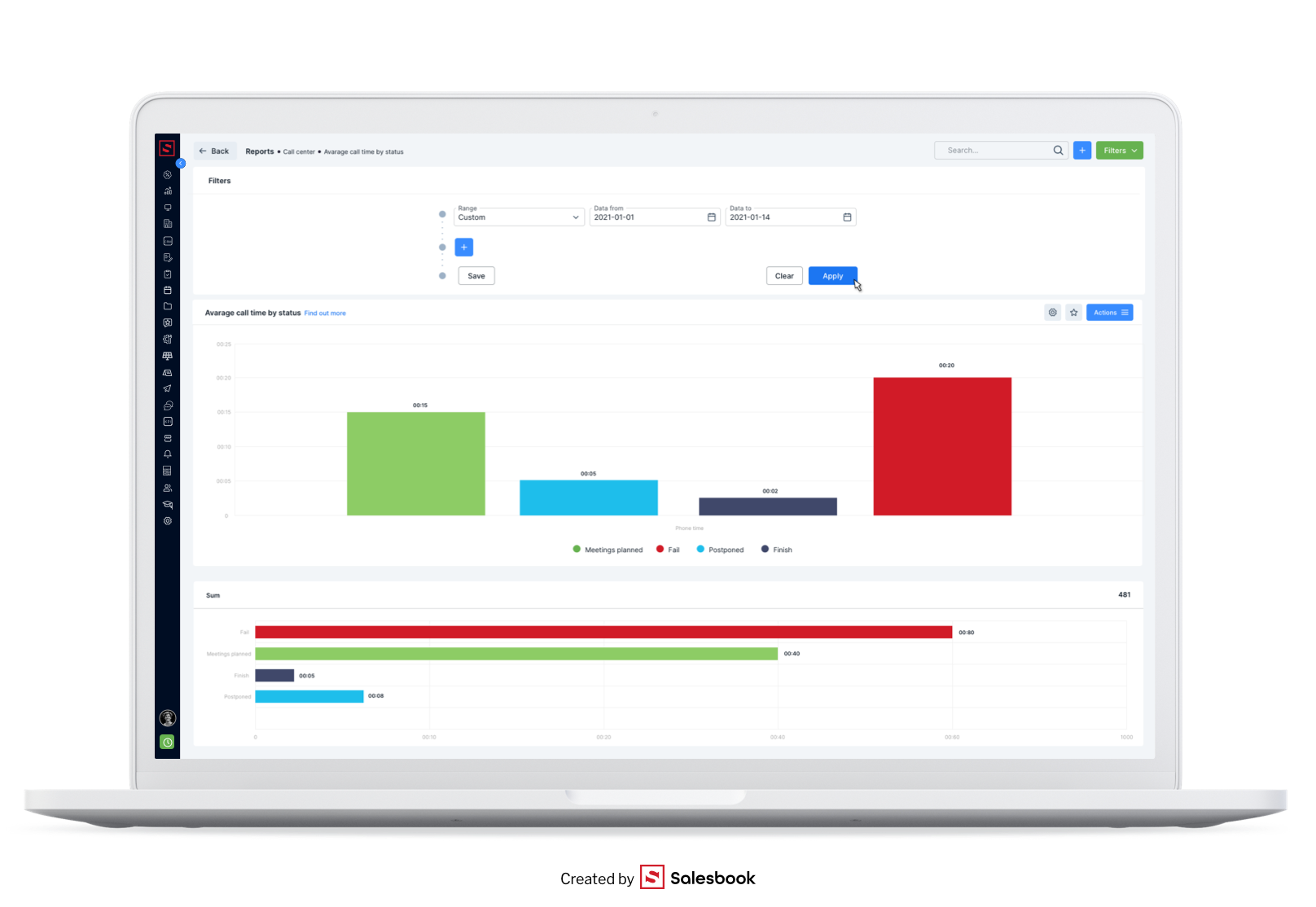
What other tools and features does Salesbook CRM have?
The ability to analyze the sales process here and now
As a manager you can support salespeople even in the middle of a meeting, receiving the collected data and seeing the steps the salesperson takes. The CRM system has all the data.
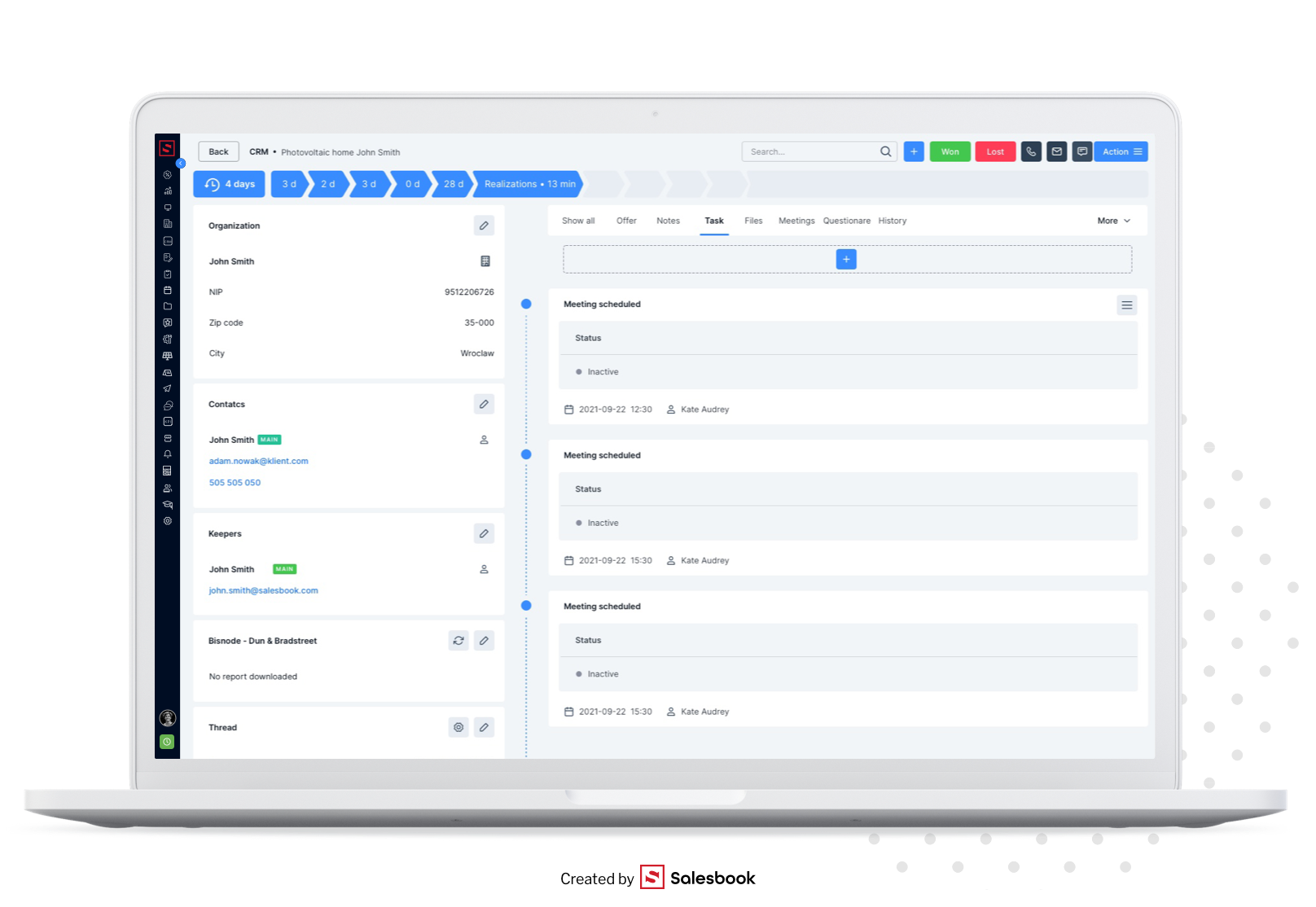
KPI module
This is a module that will allow you to set, control and achieve the intended key performance indicators.
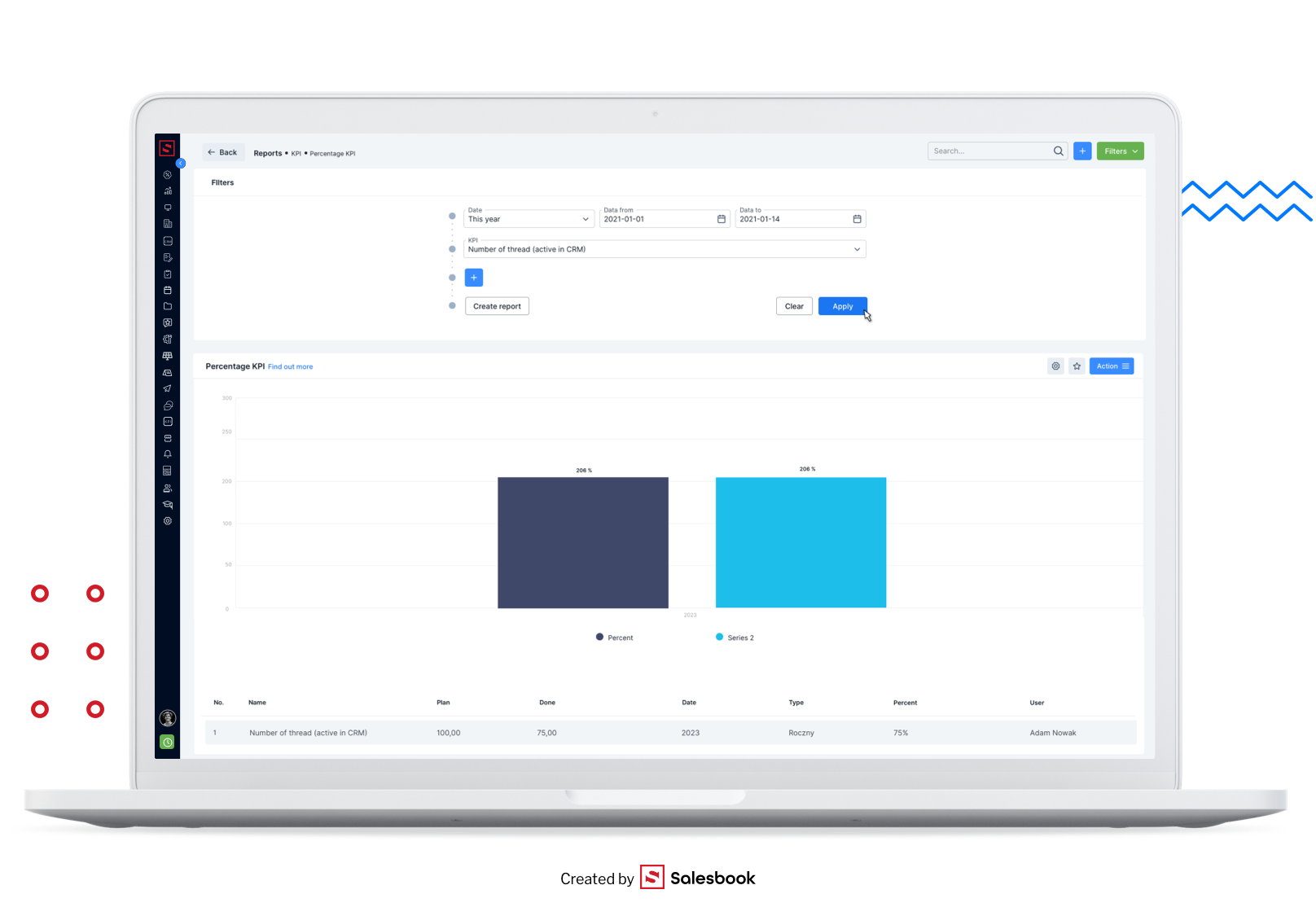
Commissions module
Thanks to it you will automatically and reliably settle the sellers for the won sales opportunities.
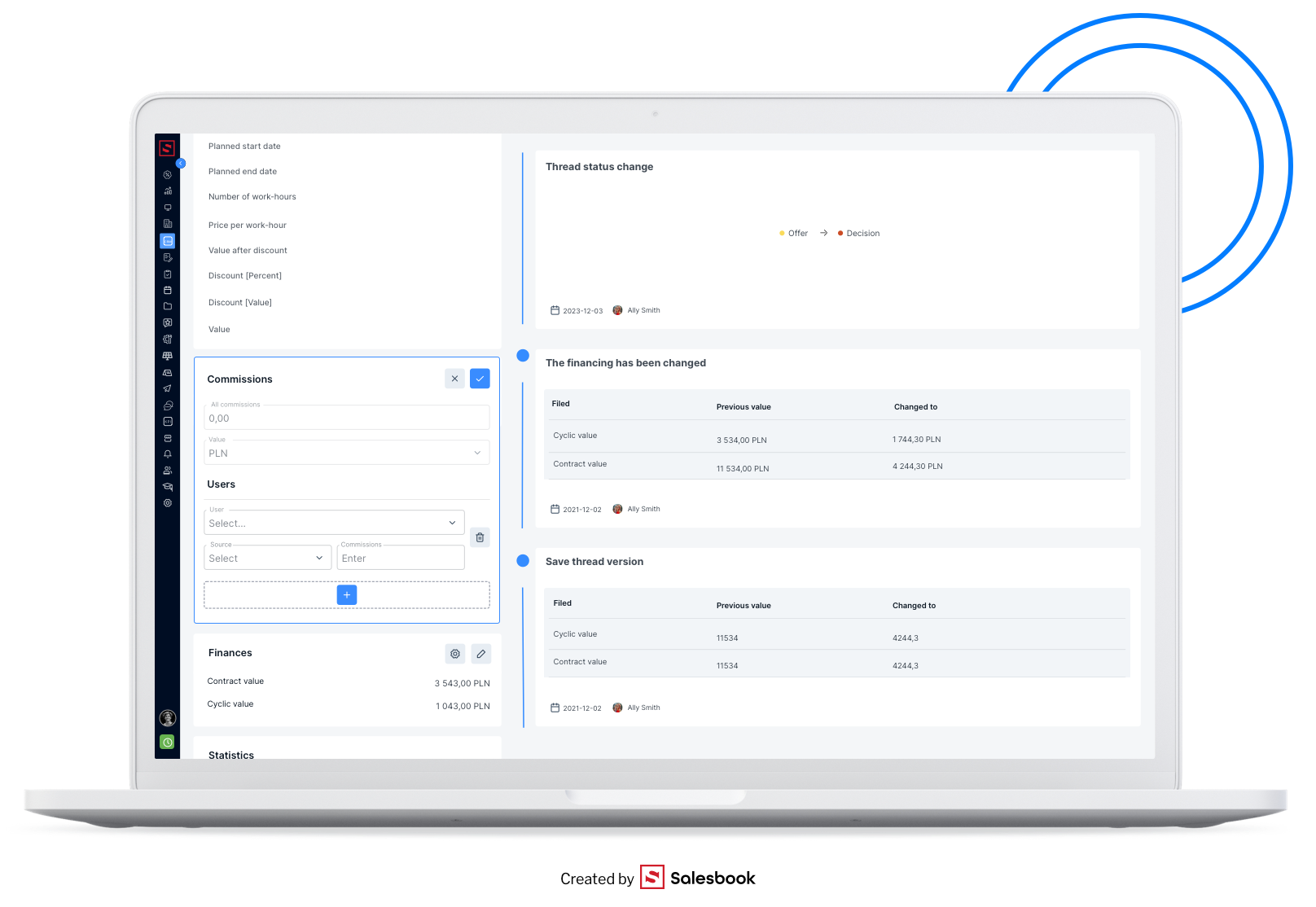
Offer Generator
You can add an offer to the CRM system in 3 different ways – using a PDF document, based on products added to the Store module, or using a needs calculator that a salesperson uses during a meeting.
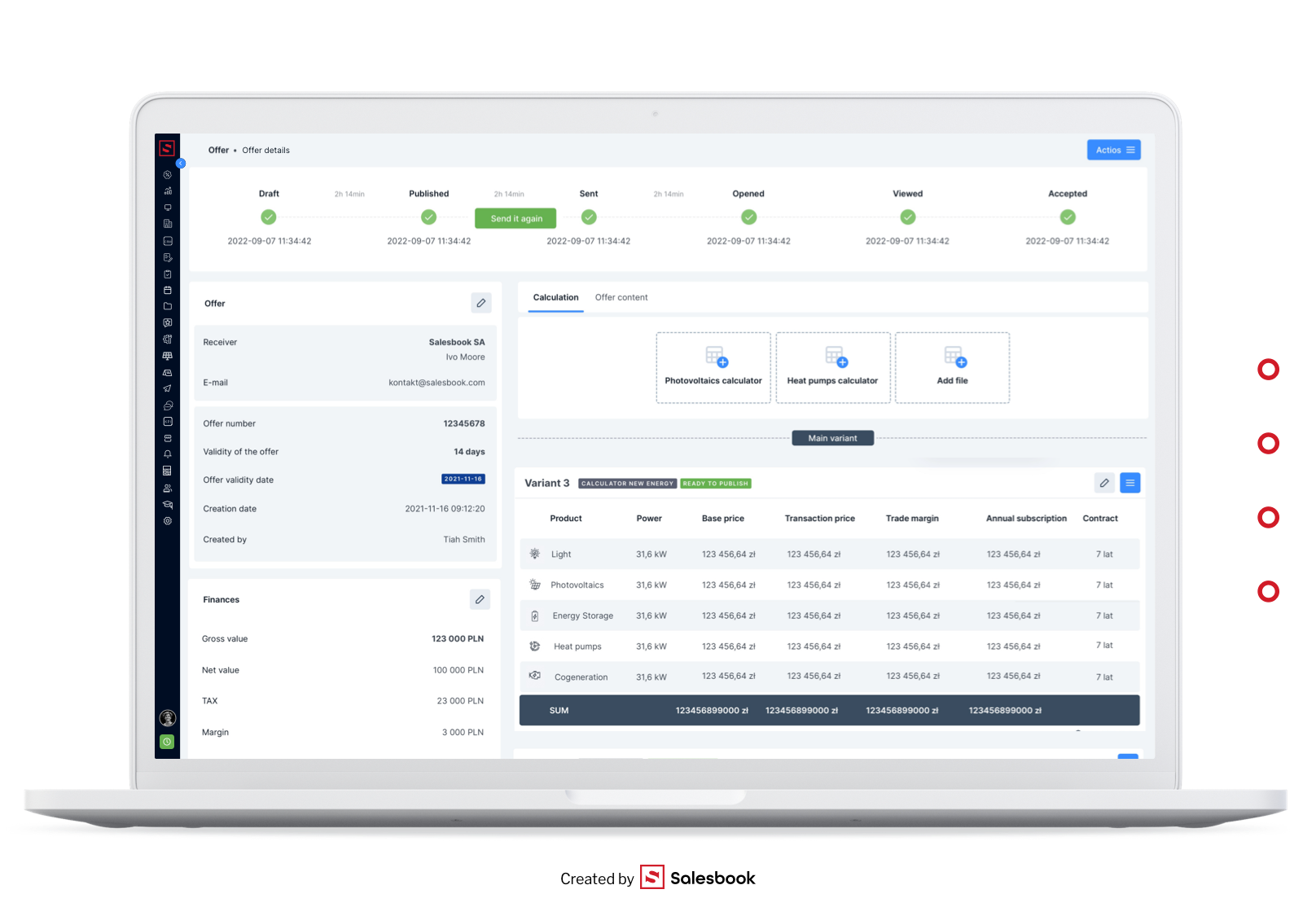
Analyze conversations and meeting effectiveness
Strengthen your sales processes by selecting only those elements of conversations and meetings that lead to the finalization of a transaction.
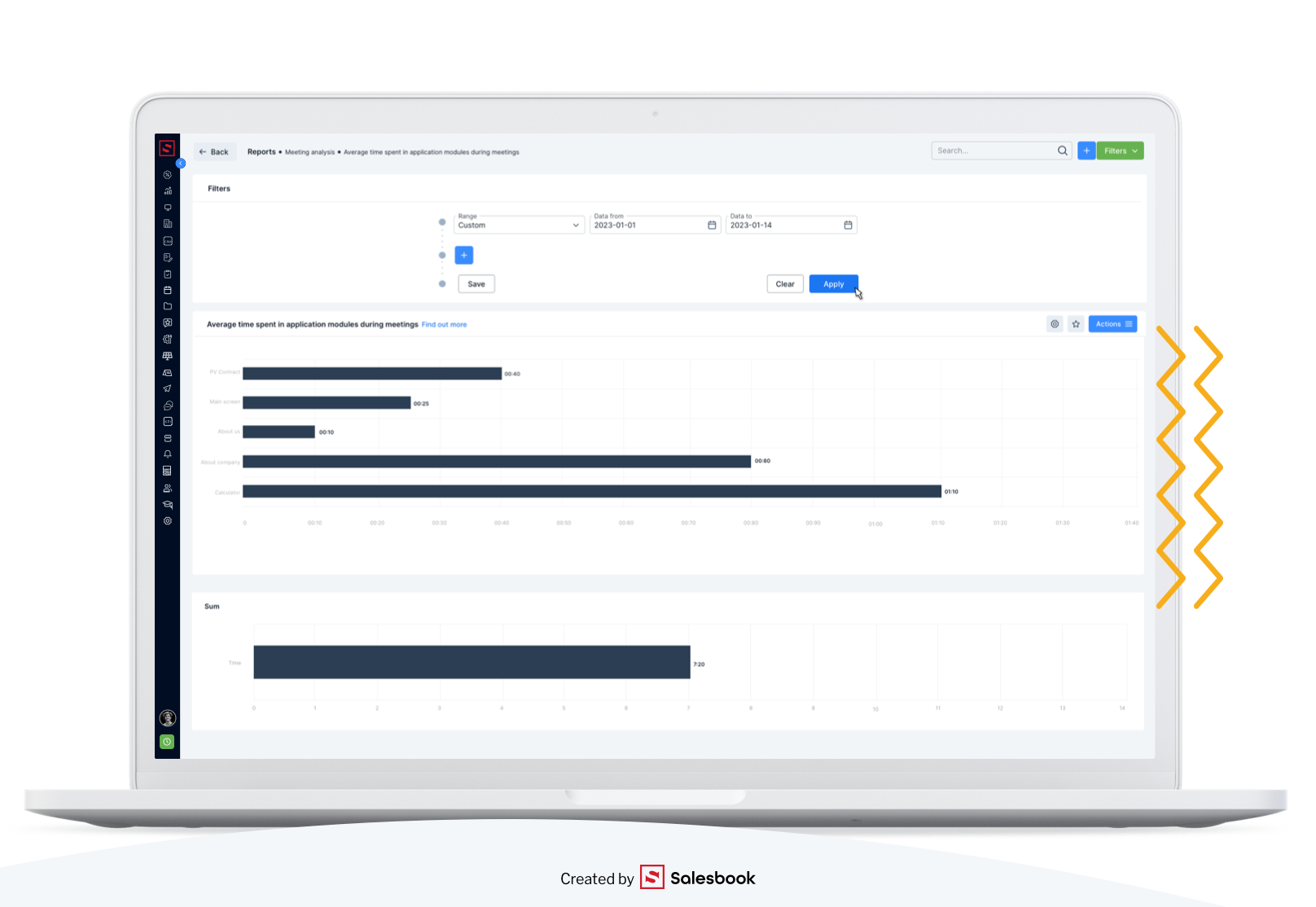
Automatic report generation
If you need to present sales results at a meeting, you can turn on your laptop anywhere and the CRM program will generate the automatic report you need.

Sales forecasting
You can track the level of sales and check whether the transaction forecasts are going as intended.
Summary
In a world where competitive edges are constantly sharpened, effective sales management has never been more crucial.
Take the lead in your industry with the right tools; there’s no better time than now to schedule a free demo of the Salesbook CRM.
Arm your team with the digital prowess to unleash their full potential and turn opportunities into profitable outcomes.
As Steve Jobs astutely noted, “Great things in business are never done by one person; they’re done by a team of people.”
Sharpen your team’s edge with proficient sales management; the first step to achieving phenomenal success begins here.
Check out CRM solutions from Salesbook
Check out how Salesbook CRM works and schedule a free demo.
Table of Contents







